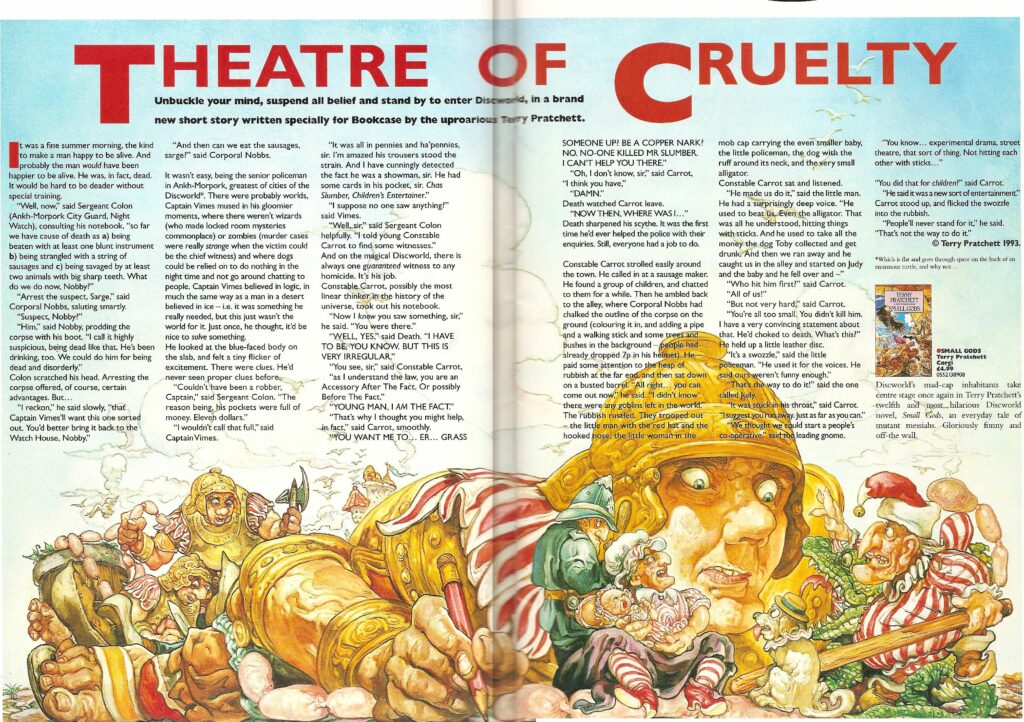#Pratchat54 – The Land Before Vimes
The Trousers of Time end up in a knot as writer Nadia Bailey rejoins Liz and Ben and we go back to the Glorious Past in the twenty-ninth Discworld novel, 2002’s Night Watch.
While pursuing dangerous killer Carcer across the rooftop of Unseen University, a magical bolt of lightning (or something) sends Sir Samuel Vimes, Commander of the City Watch and Duke of Ankh, thirty years into the past – along with his quarry. Carcer kills Vimes’ old mentor, Sergeant John Keel, and Vimes steps into Keel’s thinly-soled shoes; he’ll have to show himself the ropes to keep history intact. But he’s not just reliving any old past: it’s almost the Glorious 25th of May. The day the people deposed the paranoid Patrician Lord Winder; the day hundreds were killed in violent clashes across the city; and the day John Keel died…
Night Watch is beloved by Discworld fans, no least because it gives a double dose of everyone’s favourite “honest copper”, Sam Vimes. But he leaves Sybil in labour as he’s thrust back intp the best and worst days of his early career, forced to grapple with the darkness in his and others’ souls with only the technobabble of a few time boffin monks for guidance. It’s possibly Pratchett’s darkest book, and certainly takes us into one of the darkest corners of the Discworld: Ankh-Morpork before the rise of Vetinari and the Guilds.
Does Vimes knows where to draw the line in this book? Is Carcer an intriguing villain, or a cookie cutter evil psychopath? Could you teach your younger self everything you needed to know to become you? And is this book in your top five, or do you fail to see what all the fuss is about? Join the conversation using the hashtag #Pratchat54 on social media.
Podcast: Play in new window | Download (Duration: 2:29:37 — 68.9MB)
Guest Nadia Bailey is a writer, editor and critic. She’s published a number of pop-culture related books about such diverse subjects as Stranger Things, Frida Kahlo and Ruth Bader Ginsburg. Her latest publication is The Deck of Crystals, a deck of cards which looks into the history, superstition and lore of gemstones. Nadia has just begun a PhD researching (among other things) the lives of queer women during World War I. You can find Nadia on Twitter as @animalorchestra, or visit her website at nadiabailey.com.
As usual, you can find notes and errata for this episode on our website.
Next month we’re joining a ragtag crew of misfits on a desperate mission to save the Disc in the second big illustrated Discworld adventure, The Last Hero! And to help us navigate Paul Kidby’s astonishing illustrations, we’re welcoming back illustrator and comic book creator Georgina Chadderton. Send us your questions via the hashtag #Pratchat55, or via email to chat@pratchatpodcast.com.
Want to help us get to the end of our six(ish) year mission and read every Pratchett book – and more? You can support us with a tip, or a subscription for as little as $2 a month, and that’s cuttin’ our own throats! See our Support Us page for details.

